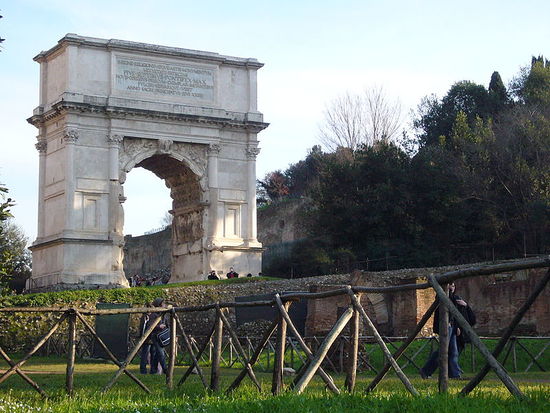Difference between revisions of "Category:Roman Period (subject)"
| Line 10: | Line 10: | ||
|logo= Logo.png | |logo= Logo.png | ||
|px= 38 | |px= 38 | ||
|content= [[File: | |content= [[File:Arch Titus.jpg|550px]] | ||
| Line 29: | Line 29: | ||
|px= 38 | |px= 38 | ||
|content= | |content= | ||
[[File: | [[File:Roman Empire map.jpg|thumb|300px|Roman Empire]] | ||
====The Beginnings of the Roman Influence in the region==== | |||
The ''Roman Period'' officially started with the conquest of Jerusalem by [[Pompey]] in 63 BCE and the end of the [[Hasmonean]] rule. However, the influence of Rome in the region goes back to the Seleucid Period. In order the undermine the solidity of the Seleucid Empire, the Romans supported the [[Maccabean Revolt]] and the {{Hasmonean Rule]]. | |||
==== Under [[Pompey]] (63-47 BCE) ==== | |||
In 63 BCE [[Pompey]] took advantage of the civil war between [[Aristobulos]] and his brother [[Hyrcanus II]] to intervene and establish Roman rule in the East. | |||
==== Under [[Julius Caesar]] (47-44 BCE) ==== | |||
In 47 BCE [[Julius Caesar]] arrived in Egypt, chasing [[Pompey]]. [[Hyrcanus II]] and [[Antipater]] supported [[Julius Caesar]]. | |||
==== Under [[Mark Antony]] (44-30 BCE) ==== | |||
In 44 BCE, after the assassination of [[Julius Caesar]] the region fell initially under the influence of [[Cassius]] but the struggle with [[Mark Antony]] changed the balance of power. Antipater, who had sided with [[Cassius]] was poisoned, while feasting with [[John Hyrcanus II]]. His children, [[Phasael]] and [[Herod the Great]] were quick enough to switch allegiance to [[Mark Antony]] and retained power. | |||
in 40-37 BCE the Roman Rule was shortly interrupted by the [[Partian Invasion]]. Mark Anthony with the support of generals such as [[Ventidius]] and [[Herod]] was able to retore the Roman rule in the region. | |||
In 34 BCE [[Mark Antony]] and [[Cleopatra]] felt strong enough to challenge the authority of [[Rome]] and [[Octavian]] by establishing an independent Kingdom in the East. [[Octavian]] with the support of his general [[Marcus Agrippa]] promptly reacted. The showdown ended in 31 BCE with the defeat of Antony and Cleopatra in the naval [[Battle of Actium]] and the invasion of Egypt in 30 BCE. Antony and [[Cleopatra]] committed suicide. [[Herod the Great]] was quick in submitting to the power of [[Octavian]] after the [[Battle of Actium]] and was confirmed as King of [[Judaea]]. | |||
==== Under [[Augustus]] (30 BCE - 14 CE) ==== | |||
After the death of [[Mark Antony]], [[Octavian]] consolidated his power, taking officially in 27 BCE the title of [[Augustus]] as the first Roman Emperor. | |||
==== Under [[Tiberius]] (14 CE - 37 CE) ==== | |||
==== Under [[Caligula]] (37 CE - 41 CE) ==== | |||
==== Under [[Claudius]] (41 CE - 54 CE) ==== | |||
==== Under [[Nero]] (54 CE - 68 CE) ==== | |||
==== Under [[Vespasian]] (69-79 CE) ==== | |||
==== Under [[Titus]] (79-81 CE) ==== | |||
==== Under [[Domitian]] (81-96 CE) ==== | |||
==== Under [[Nerva]] (96-98 CE) ==== | |||
==== Under [[Trajan]] (98-117 CE) ==== | |||
==== Under [[Hadrian]] (117-138 CE) ==== | |||
'''External links''' | |||
'''Related categories''' | |||
*[[Second Temple Judaism]] | |||
*[[Herodians]] / [[Roman Emperors]] / [[Roman Governors]] / [[High Priests]] | |||
*[[Jewish War]] / [[Bar-Kokhba Revolt]] | |||
'''External links''' | |||
}} | }} | ||
| Line 95: | Line 148: | ||
|} | |} | ||
|} | |} | ||
[[Category:Index (database)]] | [[Category:Index (database)]] | ||
[[Category:Events (database)]] | [[Category:Events (database)]] | ||
Revision as of 11:20, 6 February 2016
|
< Main Events : Parthian Invasion -- Census of Quirinius -- Jewish War -- Kitos War -- Bar-Kokhba Revolt > < People : Hasmoneans -- Herodians -- High Priests -- Messiah Claimants -/- Pompey -- Julius Caesar -- Mark Antony -- Roman Emperors -- Roman Governors of Judea -- Roman Governors of Syria -/- Teacher of Righteousness -- Philo of Alexandria -- Jesus of Nazareth -- Paul of Tarsus -- Josephus >
{{WindowMain
|
|
Pages in category "Roman Period (subject)"
The following 57 pages are in this category, out of 57 total.
1
- Der wüterich König Herodes (1552 Sachs), play
- La Mariana (1560 Dolce), play
- L’ebrea famelica (The Famishing Jewess / 1640 Caputi / Vittori), oratorio (music & libretto)
- (++) Lettres de Bérénice à Titus (Letters of Berenice to Titus / 1642 Scudéry), novel
- Bérénice (1648 Segrais), novel
- Historia Idumaea; seu, De vita & gestis Herodum (1660 Nold), book
- The Wicked Life and Wofull Death of Herod the Great (1664 Clarke), book
- The Life of Herod the Great (1678 L'Estrange), book
- La Gerusalemme convertita (1733 Zeno), libretto
- Geschichte der Römerherrschaft in Judäa und der Zerstörung Jerusalems (1847 @1847 Salvador / Eichler), book (German ed.)
- Histoire de la domination romaine en Judée et de la ruine de Jérusalem (1847 Salvador), book
- Rome et la Judée au temps de la chute de Néron (1858 Champagny), book
- Die Römischen Statthalter in Syrien und Judaea von 69 vor Christo bis 69 nach Christo (1865 Gerlach), book
- Geschichte des römischen Kaiserreichs unter der Regierung des Nero (History of the Roman Empire under the Government of Nero / 1872 Schiller), book
- Gli Ebrei sotto la dominazione romana (1888-1897 Manfrin), book
- The Jews under Roman Rule (1890 Morrison), book
- Giudei e romani fino alla morte di Tiberio (1902 Sfregola), book
- Gli Ebrei sotto la dominazione romana = The Jews under Roman Rule (1911 Morrison), book (Italian ed.)
- Rome et la Judée (1928 Ginsburg), book
- Die Zeloten (1961 Hengel), book
- Philonis Alexandrini Legatio ad Gaium (1961 Smallwood), book
- Judaea Weeping: The Jewish Struggle against Rome from Pompey to Masada (1970 Brauer), book
- The Jews in the Roman World (1973 Grant), book
- Gli ebrei sotto la dominazione romana (1974 Defendi), book
- Rzym i Jerozolima (1974 Krawczuk), book
- The Jews under Roman Rule: From Pompey to Diocletian (1976 Smallwood), book
- Josephus: The Historian and His Society (1983 Rajak), book
- Bandits, Prophets, & Messiahs (1985 Horsley), book
- The Social History of Palestine in the Herodian Period (1991 Fiensy), book
- The Death of Herod: An Essay in the Sociology of Religion (1992 Fenn), book
- The Jews among Pagans and Christians in the Roman Empire (1992 Lieu/North/Rajak), edited volume
- Das Judenedikt des Kaisers Claudius (1996 Botermann), book
- Herod the Great (1996 Green), non-fiction book
- The Cambridge History of Judaism: 3. The Early Roman Period (1999 Davies, Horbury, Sturdy), edited volume
- Vespasian (1999 Levick), book
2
- El profeta y el traidor (2000 Giorgi), novel
- Jewish Literacy in Roman Palestine (2001 Hezser), book
- The Fall of Jerusalem (2003 Muldowney / Fenton), oratorio
- Negotiating Diaspora: Jewish Strategies in the Roman Empire (2004 Barclay), edited volume
- Religion and Society in Roman Palestine (2004 Edwards), edited volume
- Imperium: Nero (2004 Marcus), feature film
- The Middle East under Rome (2004 Sartre), book (English. ed.)
- Le sourire de Bérénice (2004 Willems), novel
- Povestea smochinului: cauzele conflictului în societatea iudaica din secolul I d.Hr. (Story of the Fig Tree: The Conflict Causes in the Judaic Society of the I Century A.D. / 2006 Aldea), book
- Judaism in the Roman World (2006 Goodman), book
- Ancient Rome: Nero (2006 Murphy), TV film
- Roman Mysteries (2007-08 Marcus et al.), TV mini-series
- Jewish Perspectives on Hellenistic Rulers (2007 Rajak), edited volume
- Herod’s Judaea: A Mediterranean State in the Classical World (2008 Rocca), book
- Des fils d'Hérode á la Deuxième Guerre juive (2008 Tassin), book
- The Army of Herod the Great (2009 Rocca), book
- De los hijos de Herodes a la segunda guerra judía (2009 Tassin / Barrado, Salas), book (Spanish ed.)
- The Oxford Handbook of Jewish Daily Life in Roman Palestine (2010 Hezser), edited volume
- Hérode le Grand: constructions, mouvements spirituels ou religieux de son époque (2010 Laperrousaz), book
- Los judíos de época romana, ss. I-II d. C. (2010 Pitillas Salañer), book
- The Coins of Herod (2011 Ariel, Fontanille), book
- La fe de Jesús en el judaísmo de su tiempo (2018 Aguirre Monasterio, et al.), edited volume
Media in category "Roman Period (subject)"
The following 16 files are in this category, out of 16 total.
- 1989-T * Hengel en.jpg 400 × 625; 14 KB
- 1976 * Safrai - Stern.jpg 328 × 500; 14 KB
- 1982 * Brooten.jpg 333 × 499; 19 KB
- 1986 * Segal.jpg 323 × 499; 19 KB
- 1992 * Mendels.jpg 275 × 400; 35 KB
- 1996 * Richardson.jpg 316 × 474; 37 KB
- 1998 * Bond.jpg 298 × 499; 16 KB
- 2001 * Schwartz.jpg 967 × 1,500; 298 KB
- 2013 Gelb.jpg 333 × 499; 36 KB
- 2014 Vermes.jpg 396 × 499; 65 KB
- 2018 Richardson Fischer.jpg 331 × 499; 37 KB
- 2020 * Grabbe.jpg 333 × 499; 16 KB
- 2021 * Grabbe.jpg 333 × 499; 24 KB
- 2021 Czajkowski, Eckhardt.jpg 400 × 604; 231 KB
- 2022 Parmentier.jpg 400 × 600; 36 KB
- 2024 Goodman.jpg 400 × 570; 226 KB




















